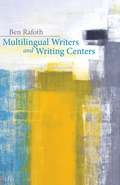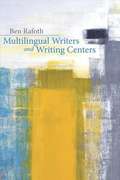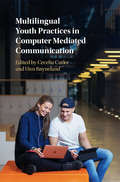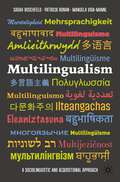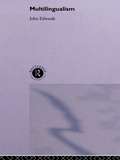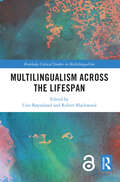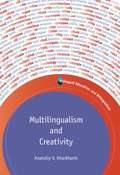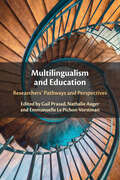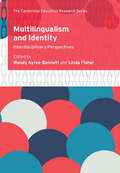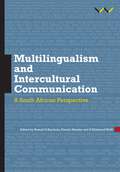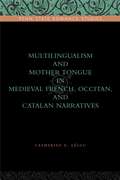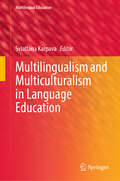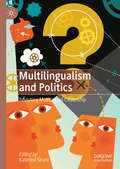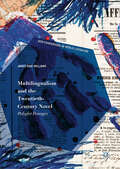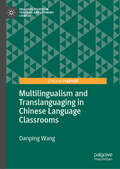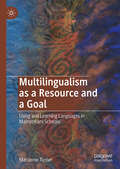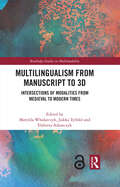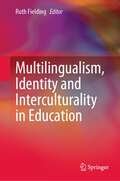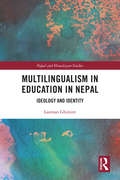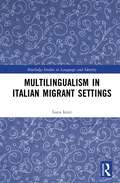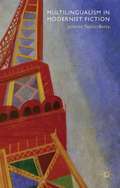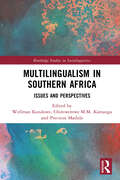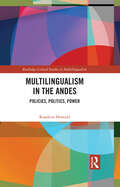- Table View
- List View
Multilingual Writers and Writing Centers
by Ben RafothMultilingual writers—often graduate students with more content knowledge and broader cultural experience than a monolingual tutor—unbalance the typical tutor/client relationship and pose a unique challenge for the writing center. Multilingual Writers and Writing Centers explores how directors and tutors can better prepare for the growing number of one-to-one conferences with these multilingual writers they will increasingly encounter in the future. This much-needed addition of second language acquisition (SLA) research and teaching to the literature of writing center pedagogy draws from SLA literature; a body of interviews Rafoth conducted with writing center directors, students, and tutors; and his own decades of experience. Well-grounded in daily writing center practice, the author identifies which concepts and practices directors can borrow from the field of SLA to help tutors respond to the needs of multilingual writers, what directors need to know about these concepts and practices, and how tutoring might change in response to changes in student populations. Multilingual Writers and Writing Centers is a call to invigorate the preparation of tutors and directors for the negotiation of the complexities of multilingual and multicultural communication.
Multilingual Writers and Writing Centers
by Ben RafothMultilingual writers-often graduate students with more content knowledge and broader cultural experience than a monolingual tutor-unbalance the typical tutor/client relationship and pose a unique challenge for the writing center. Multilingual Writers and Writing Centers explores how directors and tutors can better prepare for the growing number of one-to-one conferences with these multilingual writers they will increasingly encounter in the future. This much-needed addition of second language acquisition (SLA) research and teaching to the literature of writing center pedagogy draws from SLA literature; a body of interviews Rafoth conducted with writing center directors, students, and tutors, and his own decades of experience. Well-grounded in daily writing center practice, the author addresses which concepts and practices directors can borrow from the field of SLA to help tutors respond to the needs of multilingual writers, what directors need to know about these concepts and practices, and how tutoring might change in response to changes in student populations. Multilingual Writers and Writing Centers is a call to invigorate the preparation of tutors and directors for the negotiation of the complexities of multilingual and multicultural communication.
Multilingual Youth Practices in Computer Mediated Communication
by Cecelia Cutler Unn RøynelandWith an eye to the playful, reflexive, self-conscious ways in which global youth engage with each other online, this volume analyzes user-generated data from these interactions to show how communication technologies and multilingual resources are deployed to project local as well as trans-local orientations. With examples from a range of multilingual settings, each author explores how youth exploit the creative, heteroglossic potential of their linguistic repertoires, from rudimentary attempts to engage with others in a second language to hybrid multilingual practices. Often, their linguistic, orthographic, and stylistic choices challenge linguistic purity and prescriptive correctness, yet, in other cases, their utterances constitute language policing, linking 'standardness' or 'correctness' to piety, trans-local affiliation, or national belonging. Written for advanced undergraduates, postgraduates and researchers in linguistics, applied linguistics, education and media and communication studies, this volume is a timely and readymade resource for researching online multilingualism with a range of methodologies and perspectives.
Multilingualism: A Sociolinguistic and Acquisitional Approach
by Sarah Buschfeld Patricia Ronan Manuela Vida-MannlThis textbook takes a broad perspective on multilingualism, using a sociolinguistics and acquisition-informed approach that treats multilingualism not solely as the mastery of two or more well-defined language systems, but rather as a continuum of linguistic repertoires and resources to be used in different settings and combinations. The authors introduce traditional aspects of multilingualism - including historical dimensions, societal and individual multilingualism, aspects of identities, ideologies, education, and language policies - before going on to examine newer manifestations such as multilingualism in migrant and refugee contexts, in new media, pop music and linguistic landscaping, as well as the notion of grassroots multilingualism. This textbook will be an ideal resource for postgraduate students of linguistics and multilingualism, as well as advanced undergraduate students who are looking for a nuanced and holistic approach to the topic.
Multilingualism: Understanding Linguistic Diversity
by John EdwardsBy looking at the effect of language difference, rather than at theories of language, John Edwards examines the interaction of language with nationalism, politics, history, identity and education. He illustrates his arguments with a rangew of examples, from recent attempts to revive and preserve languages such as Irish and Basque, to the argument over French and English in Canada and the `US English' campaign. He also examines the linguistic myopia of those who would seek to elevate one language over another. Multilingualism unpicks the complexity associated with a world of so many languages, and creates an overview which is multidisciplinary in focus. Its mixture of curious facts, wit and eloquence, will appeal to anyone who cares about the role of language in society.
Multilingualism
by Anat Stavans Charlotte HoffmannHow do children and adults become multilingual? How do they use their languages? What influence does being multilingual have on their identities? What is the social impact of multilingualism today and how do societies accommodate it? These are among the fascinating questions examined by this book. Exploring multilingualism in individuals and in society at large, Stavans and Hoffmann argue that it evolves not from one factor in particular, but from a vast range of environmental and personal influences and circumstances: from migration to globalisation, from the spread of English to a revived interest in minority languages, from social mobility to intermarriage. The book shows the important role of education in helping to promote or maintain pupils' multilingual language competence and multilingual literacy, and in helping to challenge traditional monolingual attitudes. A clear and incisive account of this growing phenomenon, it is essential reading for students, teachers and policy-makers alike.
Multilingualism across the Lifespan (Routledge Critical Studies in Multilingualism)
by Unn Røyneland and Robert BlackwoodThis innovative collection examines key questions on language diversity and multilingualism running through contemporary debates in psycholinguistics and sociolinguistics. Reinforcing interdisciplinary conversations on these themes, each chapter is co-authored by two different researchers, often those who have not written together before. The combined effect is a volume showcasing unique and dynamic perspectives on such topics as multilingualism across the lifespan, bilingual acquisition, family language policy, language and ageing, language shift, language and identity, and multilingualism and language impairment. The book builds on Elizabeth Lanza’s pioneering work on multilingualism across the lifespan, bringing together cutting-edge research exploring multilingualism as an evolving phenomenon at landmarks in individuals’, families’, and communities’ lives. Taken together, the book offers a rich portrait of the different facets of multilingualism as a lived reality for individuals, families, and communities. This ground-breaking volume will be of particular interest to students and scholars in multilingualism, applied linguistics, sociolinguistics, and psycholinguistics.
Multilingualism and Creativity
by Anatoliy V. KharkhurinIn this monograph, Anatoliy V. Kharkhurin presents the results of his empirical investigation into the impact of multilingual practice on an individual's creative potential. Until now, the relationship between these two activities has received little attention in the academic community. The book makes an attempt to resuscitate this theme and provides a solid theoretical framework supported by contemporary empirical research conducted in a variety of geographic, linguistic, and sociocultural locations. This study demonstrates that several factors - such as the multilinguals' age of language acquisition, proficiency in these languages and experience with cultural settings in which these languages were acquired - have a positive impact on selective attention and language mediated concept activation mechanisms. Together, these facilitate generative and innovative capacities of creative thinking. This book will be of great interest not only to scholars in the fields of multilingualism and creativity, but also to educators and all those interested in enhancing foreign language learning and fostering creativity.
Multilingualism and Education: Researchers' Pathways and Perspectives
by Gail Prasad Nathalie Auger Le Pichon-Vorstman, EmmanuelleFor decades, international researchers and educators have sought to understand how to address cultural and linguistic diversity in education. This book offers the keys to doing so: it brings together short biographies of thirty-six scholars, representing a wide range of universities and countries, to allow them to reflect on their own personal life paths, and how their individual life experiences have led to and informed their research. This approach highlights how theories and concepts have evolved in different contexts, while opening up pedagogical possibilities from diverse backgrounds and enriched by the life experiences of leading researchers in the field. Beyond these questions, the book also explores the dynamic relationships between languages, power and identities, as well as how these relationships raise broader societal issues that permeate both global and local language practices. It is essential reading for students, teacher educators, and researchers interested in the impact of multilingualism on education.
Multilingualism and Identity: Interdisciplinary Perspectives (Cambridge Education Research)
by Wendy Ayres-Bennett Linda FisherThe analysis and understanding of multilingualism, and its relationship to identity in the face of globalization, migration and the increasing dominance of English as a lingua franca, makes it a complex and challenging problem that requires insights from a range of disciplines. With reference to a variety of languages and contexts, this book offers fascinating insights into multilingual identity from a team of world-renowned scholars, working from a range of different theoretical and methodological perspectives. Three overarching themes are explored – situatedness, identity practices, and investment – and detailed case studies from different linguistic and cultural contexts are included throughout. The chapter authors' consideration of 'multilingualism-as-resource' challenges the conception of 'multilingualism-as-problem', which has dogged so much political thinking in late modernity. The studies offer a critical lens on the types of linguistic repertoire that are celebrated and valued, and introduce the policy implications of their findings for education and wider social issues.
Multilingualism and Intercultural Communication: A South African perspective
by H. Ekkehard Wolff Russell H Kaschula Pamela Maseko Christine Anthonissen Bassey E AntiaAn in-depth look at the changing sociolinguistic dynamics that have influenced South African society. To date, there has been no published textbook which takes into account changing sociolinguistic dynamics that have influenced South African society. Multilingualism and Intercultural Communication breaks new ground in this arena. The scope of this book ranges from macro-sociolinguistic questions pertaining to language policies and their implementation (or non-implementation) to micro-sociolinguistic observations of actual language-use in verbal interaction, mainly in multilingual contexts of Higher Education (HE). There is a gradual move for the study of language and culture to be taught in the context of (professional) disciplines in which they would be used, for example, Journalism and African languages, Education and African languages, etc. The book caters for this growing market. Because of its multilingual nature, it caters to English and Afrikaans language speakers, as well as the Sotho and Nguni language groups _ the largest languages in South Africa [and also increasingly used in the context of South African Higher Education]. It brings together various inter-linked disciplines such as Sociolinguistics and Applied Language Studies, Media Studies and Journalism, History and Education, Social and Natural Sciences, Law, Human Language Technology, Music, Intercultural Communication and Literary Studies. The unique cross-cutting disciplinary features of the book will make it a must-have for twenty-first century South African students and scholars and those interested in applied language issues.
Multilingualism and Mother Tongue in Medieval French, Occitan, and Catalan Narratives (Penn State Romance Studies #11)
by Catherine E. LégluThe Occitan literary tradition of the later Middle Ages is a marginal and hybrid phenomenon, caught between the preeminence of French courtly romance and the emergence of Catalan literary prose. In this book, Catherine Léglu brings together, for the first time in English, prose and verse texts that are composed in Occitan, French, and Catalan-sometimes in a mixture of two of these languages. This book challenges the centrality of "canonical" texts and draws attention to the marginal, the complex, and the hybrid. It explores the varied ways in which literary works in the vernacular composed between the twelfth and fifteenth centuries narrate multilingualism and its apparent opponent, the mother tongue. Léglu argues that the mother tongue remains a fantasy, condemned to alienation from linguistic practices that were, by definition, multilingual. As most of the texts studied in this book are works of courtly literature, these linguistic encounters are often narrated indirectly, through literary motifs of love, rape, incest, disguise, and travel.
Multilingualism and Multiculturalism in Language Education (Multilingual Education #49)
by Sviatlana KarpavaThis volume focuses on multidisciplinary approaches to multilingualism, multiculturalism and language teaching and learning at (pre)primary, secondary and tertiary levels. It addresses both top-down and bottom-up perspectives on language education policies, teacher training and preparation. The book explores the needs and challenges related to education in multilingual classrooms, the relationship between parents and educators, and linguistic and cultural diversity in classrooms. It draws on the findings of research that has been conducted worldwide including in Cyprus, USA, UK, Scotland, Spain, France, Sri Lanka, Slovenia, Australia, New Zealand, Indonesia, Hong Kong, Sweden, Greece, and Italy. This book is ideal for students of (applied) linguistics, (socio)linguistics, psycholinguistics, language acquisition and education, as well as practitioners, teachers, parents, experts and researchers wishing to update their knowledge regarding multilingualism, multiculturalism, language learning, and teaching.
Multilingualism and Politics: Revisiting Multilingual Citizenship
by Katerina StraniThis edited book makes a significant contribution to the relatively under-explored field of multilingualism and politics, approaching the topic from two key perspectives: multilingualism in politics, and the politics of multilingualism. Through the lens of case studies from around the world, the authors in this volume combine theoretical and empirical insights to examine the inter-relation between multilingualism and politics in different spheres and contexts, including minority language policy, national identity, the translation of political debates and discourse, and the use of multiple, often competing languages in educational settings. This book will be of interest to students and scholars in the fields of politics, sociology, sociolinguistics, language policy, and translation and interpreting studies.
Multilingualism and the Twentieth-Century Novel: Polyglot Passages (New Comparisons in World Literature)
by James Reay WilliamsThis book argues that the Anglophone novel in the twentieth century is, in fact, always multilingual. Rooting its analysis in modern Europe and the Caribbean, it recognises that monolingualism, not multilingualism, is a historical and global rarity, and argues that this fact must inform our study of the novel, even when it remains notionally Anglophone. Drawing principally upon four authors – Joseph Conrad, Jean Rhys, Wilson Harris and Junot Díaz – this study argues that a close engagement with the novel reveals a series of ways to apprehend, depict and theorise various kinds of language diversity. In so doing, it reveals the presence of the multilingual as a powerful shaping force for the direction of the novel from 1900 to the present day which cuts across and complicates current understandings of modernist, postcolonial and global literatures.
Multilingualism and Translanguaging in Chinese Language Classrooms (Palgrave Studies in Teaching and Learning Chinese)
by Danping WangThis book presents new research on Chinese as a Second Language (CSL) teaching from an ethnographic classroom study on classroom translanguaging practices that highlights the policy and pedagogical implications of adopting a creative and principled multilingual approach. Drawing on a case study from Hong Kong, it analyses naturally observed language patterns in CSL classrooms and the attitudes of students and teachers towards prescribed classroom language policies, and thereby demonstrates the importance of mixing Chinese, English and students’ home languages to achieve successful second language learning. It discusses the nature and guiding principles for classroom translanguaging research and provides research tools that will enable second language teachers to examine their own language practices. The author argues persuasively that second language teaching practices and policies must reflect the current reality of language use and the diverse learning needs of multilingual students. This book will appeal to teacher educators and researchers in fields such as second language acquisition, foreign language teaching and language policy.
Multilingualism as a Resource and a Goal: Using and Learning Languages in Mainstream Schools
by Marianne TurnerThis book explores multilingualism as a resource and goal at school in contexts of student diversity and institutional monolingualism. Combining translanguaging theory and sociocultural theory, the author proposes a framework for the learning and use of both foreign and heritage languages across the curriculum in mainstream schools. By clearly linking language practices to teaching and learning objectives, the book aims to support school leaders and practitioners make informed decisions about how best to promote multilingualism in their school, as well as to enhance the learning outcomes of bi/multilinguals. In addition to school leaders and practitioners, it will be of interest to students and academics in the fields of bilingual education and TESOL, as well as applied linguistics and language teaching more broadly.
Multilingualism, Discourse, and Ethnography (Routledge Critical Studies in Multilingualism)
by Sheena Gardner Marilyn Martin-JonesOver the last twenty years, sociolinguistic research on multilingualism has been transformed. Two processes have been at work: first, an epistemological shift to a critical ethnographic approach, which has contributed to a larger turn toward post-structuralist perspectives on social life. Second, the effects of globalization—transnational population flows, new communication technologies, transformations in the political and economic landscape—have sparked increasing concern about the implications of these changes for our understanding of the relationship between language and society. A new sociolinguistics of multilingualism is being forged: one that takes account of the new communicative order, while retaining a central concern with the processes in the construction of social difference. The contributors to this volume have been at the forefront of these epistemological shifts. They write here about the conceptual and methodological challenges posed by these shifts, and the profound changes that we are witnessing in the late modern era.
Multilingualism from Manuscript to 3D: Intersections of Modalities from Medieval to Modern Times (Routledge Studies in Multimodality)
by Matylda Włodarczyk Jukka Tyrkkö Elżbieta AdamczykThis collection explores the links between multimodality and multilingualism, charting the interplay between languages, channels, and forms of communication in multilingual written texts from historical manuscripts through to the new media of today and the non-verbal associations they evoke. The volume argues that features of written texts such as graphics, layout, boundary marking, and typography are inseparable from verbal content. Taken together, the chapters adopt a systematic historical perspective to investigate this interplay over time and highlight the ways in which the two disciplines might further inform one another in the future as new technologies emerge. The first half of the volume considers texts where semiotic resources are the sites of modes, where multiple linguistic codes interact on the page and generate extralinguistic associations through visual features and spatial organizaisation. The second half of the book looks at texts where this interface occurs not in the text but rather in the cultural practices involved in social materiality and text transmission. Enhancing our understandings of multimodal resources in both historical and contemporary communication, this book will be of interest to scholars in multimodality, multilingualism, historical communication, discourse analysis, and cultural studies.
Multilingualism, Identity and Interculturality in Education
by Ruth FieldingThis book brings together research on multilingualism, identity and intercultural understanding from a range of locations across the globe to explore the intersection of these key ideas in education. It addresses the need to better understand how multilingual, identity, and intercultural approaches intersect for multilingual learners in complex and varied settings. Through global examples, it explores how identities and multilingualism are situated within, and surrounding intercultural experiences. This book examines the different theoretical interpretations as encountered and used in different contexts. By doing so, it helps readers better understand how teachers approach multilingualism and diversity in a range of contexts.
Multilingualism in Education in Nepal: Ideology and Identity (Nepal and Himalayan Studies)
by Laxman GhimireThis book explores the development of multilingual policy in education in Nepal in sociopolitical and historical contexts and examines the frameworks of language use in schools. It investigates the dynamics and factors that influence the process of construction and appropriation of the policy of multilingualism in education. The book surveys the language situation in schools and discusses how it is impacted by local language positions, societal power relations, ideological and identity contestations, and the attitude, language behaviour and resistance of key actors. It highlights the role of pedagogy, linguistics and politics that govern the policy of multilingual education. The author assesses the prospects of a multilingual approach to learning via teacher preparation, curriculum and learning material development, coordination of actors and institutions, and resources available in schools. The book presents Nepal’s linguistic background while discussing how multilingualism in education recognises local languages to improve the quality of learning in classrooms in ethnolinguistic communities. Evaluating the use of local languages in classrooms, it explores monolingual, multilingual and language maintenance frameworks of multilingualism in education. This book will be of interest to teachers, students, and researchers of education and educational studies, linguistics, sociology of education, school education, language studies, sociolinguistics, language policy and planning, public administration, ethnolinguistics, and sociology of language. It will also be useful to educationists, policymakers, linguists, sociolinguists and those working in related areas.
Multilingualism in Italian Migrant Settings (Routledge Studies in Language and Identity)
by Luca IezziMultilingualism in Italian Migrant Settings investigates the plural linguistic practices of the migrants in a particular refugee centre in Italy, the CAS (centri di accoglienza straordinaria; “extraordinary refugee centre”).This book offers a practical and rigorous study of contact situations surrounding migrants from areas with complex repertoires. Language is inherently connected to migration, especially through its role as a principal tool for communication.This volume places multilingualism in migratory contexts to comprehend how plurilingual migrants move freely between languages, and to evaluate their role in the linguistic landscape of the host country.This monograph will appeal to scholars specialising in sociolinguistics and contact linguistics. The volume will also be informative for postgraduate students in the field of sociolinguistics, with a focus on migration and language use.
Multilingualism in Modernist Fiction
by Juliette Taylor-BattyThis new study argues that modernist literature is characterised by a 'multilingual turn'. Examining the use of different languages in the fiction of a range of writers, including Lawrence, Richardson, Mansfield, Rhys, Joyce and Beckett, Taylor-Batty demonstrates the centrality of linguistic plurality to modernist forms of defamiliarisation.
Multilingualism in Southern Africa: Issues and Perspectives (Routledge Studies in Sociolinguistics)
by Wellman Kondowe Kamanga, Chimwemwe M.M. Precious MadulaThis collection showcases perspectives from established and emerging scholars on the contemporary landscape of multilingualism in Southern Africa. The book explores the broader impact of colonialism and neocolonialism on language policies and practices, drawing on case studies from such countries as Malawi, South Africa, Tanzania, Zimbabwe and Zambia.The volume is organised thematically around four different sections, looking at issues around linguistic diversity across different sectors including contemporary debates on African languages, language education, youth languages and language documentation. Taken together, the collection seeks to offer readers with a more nuanced understanding of fundamental issues in the development of multilingualism across different countries in Southern Africa today and encourage future research on multilingualism in Africa more broadly. The volume will be of interest to students and scholars in multilingualism, sociolinguistics, language policies, language education and African studies.
Multilingualism in the Andes: Policies, Politics, Power (Routledge Critical Studies in Multilingualism)
by Rosaleen HowardThis illuminating book critically examines multicultural language politics and policymaking in the Andean-Amazonian countries of Ecuador, Peru, and Bolivia, demonstrating how issues of language and power throw light on the relationship between Indigenous peoples and the state. Based on the author’s research in Ecuador, Peru, and Bolivia over several decades, Howard draws comparisons over time and space. With due attention to history, the book’s focus is situated in the years following the turn of the millennium, a period in which ideological shifts have affected continuity in official policy delivery even as processes of language shift from Indigenous languages such as Aymara and Quechua, to Spanish, have accelerated. The book combines in-depth description and analysis of state-level activity with ethnographic description of responses to policy on the ground. The author works with concepts of technologies of power and language regimentation to draw out the hegemonic workings of power as exercised through language policy creation at multiple scales. This book will be key reading for students and scholars of critical sociolinguistic ethnography, the history, society and politics of the Andean region, and linguistic anthropology, language policy and planning, and Latin American studies more broadly.
